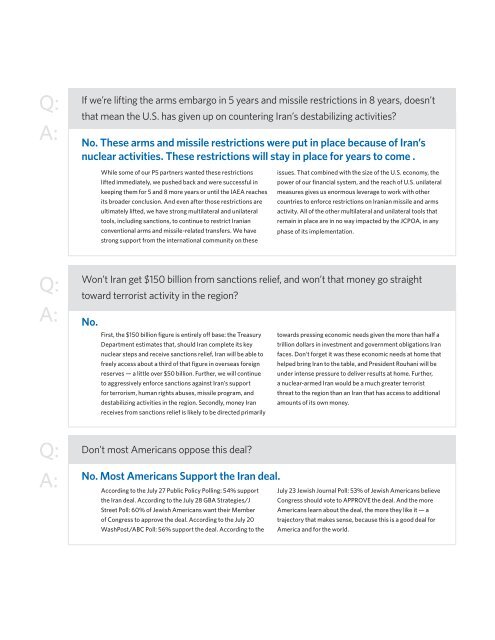WHAT YOU NEED TO KNOW ABOUT THE JCPOA
jcpoa_what_you_need_to_know
jcpoa_what_you_need_to_know
- No tags were found...
You also want an ePaper? Increase the reach of your titles
YUMPU automatically turns print PDFs into web optimized ePapers that Google loves.
Q:A:If we’re lifting the arms embargo in 5 years and missile restrictions in 8 years, doesn’tthat mean the U.S. has given up on countering Iran’s destabilizing activities?No. These arms and missile restrictions were put in place because of Iran’snuclear activities. These restrictions will stay in place for years to come .While some of our P5 partners wanted these restrictionslifted immediately, we pushed back and were successful inkeeping them for 5 and 8 more years or until the IAEA reachesits broader conclusion. And even after those restrictions areultimately lifted, we have strong multilateral and unilateraltools, including sanctions, to continue to restrict Iranianconventional arms and missile-related transfers. We havestrong support from the international community on theseissues. That combined with the size of the U.S. economy, thepower of our financial system, and the reach of U.S. unilateralmeasures gives us enormous leverage to work with othercountries to enforce restrictions on Iranian missile and armsactivity. All of the other multilateral and unilateral tools thatremain in place are in no way impacted by the <strong>JCPOA</strong>, in anyphase of its implementation.Q:A:Won’t Iran get $150 billion from sanctions relief, and won’t that money go straighttoward terrorist activity in the region?No.First, the $150 billion figure is entirely off base: the Treasury towards pressing economic needs given the more than half aDepartment estimates that, should Iran complete its key trillion dollars in investment and government obligations Irannuclear steps and receive sanctions relief, Iran will be able to faces. Don’t forget it was these economic needs at home thatfreely access about a third of that figure in overseas foreign helped bring Iran to the table, and President Rouhani will bereserves — a little over $50 billion. Further, we will continue under intense pressure to deliver results at home. Further,to aggressively enforce sanctions against Iran’s support a nuclear-armed Iran would be a much greater terroristfor terrorism, human rights abuses, missile program, and threat to the region than an Iran that has access to additionaldestabilizing activities in the region. Secondly, money Iran amounts of its own money.receives from sanctions relief is likely to be directed primarilyQ:A:Don’t most Americans oppose this deal?No. Most Americans Support the Iran deal.According to the July 27 Public Policy Polling: 54% support July 23 Jewish Journal Poll: 53% of Jewish Americans believethe Iran deal. According to the July 28 GBA Strategies/J Congress should vote to APPROVE the deal. And the moreStreet Poll: 60% of Jewish Americans want their Member Americans learn about the deal, the more they like it — aof Congress to approve the deal. According to the July 20 trajectory that makes sense, because this is a good deal forWashPost/ABC Poll: 56% support the deal. According to the America and for the world.


